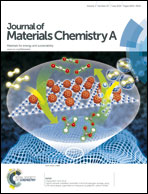Mesoporous carbon/silicon composite anodes with enhanced performance for lithium-ion batteries
Abstract
Silicon offers the highest theoretical capacity among all anode materials investigated for Li-ion batteries, making it a promising alternative anode to the currently used graphite. However, Si anodes still face significant challenges for commercialization because of the poor cycling performance induced by the huge volume change (300%) that occurs during the insertion/extraction of lithium ions. In this paper, we report a mesoporous C/Si composite synthesized by an organic–organic self-assembly of a triblock copolymer and a resorcinol–formaldehyde resin. Large number of hydroxyl groups of the RF resin directs the formation of a mesostructure and coating/dispersion of the Si nanoparticles by strong hydrogen bonding interactions. The mesoporous carbon matrix efficiently accommodates the volume change of nano-Si and maintains the integrity of the nano-Si electrodes. Significant improvement in the electrochemical performance was demonstrated in comparison with the bare Si nanoparticle anodes. In addition, the synthesis method can be easily scaled up for mass production.


 Please wait while we load your content...
Please wait while we load your content...